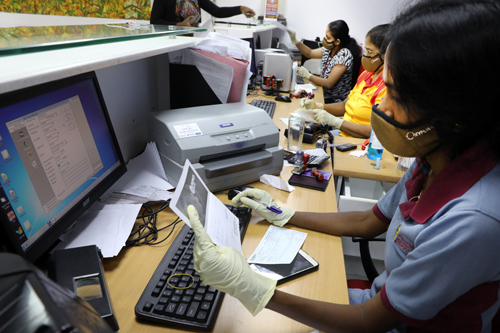Most jobs in a company cannot be performed from home

The counter at the Minuwangoda People’s Bank. Pic by M.A. Pushpa Kumara.
While organisations are trying to implement the ‘work from home’ rule amongst its employees during the COVID-19 lockdown, it has come to a point of realization that 50 per cent of these jobs cannot be performed from home.
Meanwhile 15 per cent of companies feel working from home has always been a part of the organisation’s work culture and therefore the work from home arrangement was seamless, through effective use of technology. 17 per cent of companies have faced challenges in terms of the availability of the required technological infrastructure to work from home, which have not yet been addressed to a great degree. Seven per cent of organisations feel that the employees have struggled to adjust to the culture of working from home while 11 per cent of organisations have faced other challenges in remote working.
These points emerged in a survey carried out by Ernst & Young (EY) Sri Lanka amongst the business community in Sri Lanka by EY People Advisory Services, Senior Manager, Janani Seyone. She made a presentation on Thursday during a webinar organised by EY on “Sri Lankan Market Trends; The pivotal role of HR now, next and beyond”.
She also mentioned that industries mostly hit by the pandemic are manufacturing, construction, tourism and hospitality sectors which contributes 45 per cent to the country’s GDP while 50 per cent of the labour force are mainly from these sectors. Tourism and hospitality will take as long as one year to recover from the pandemic while manufacturing and construction will take at least nine months to recover, according to the survey. These industries have announced a 100 per cent reduction in capital expenditure, noted Ms. Seyone.
Further on the understanding what matters in the next three months, 3-6 months and beyond six months Ms. Seyone elaborated, in the next three months companies will be responding to the crisis focusing on business continuity and planning while the CEO and HR combine and protect its employees. Within 3-6 months companies will manage a restricted business, leading through ongoing business disruption and responding to medium term challenges and opportunities. After six months organisations will understand the ‘new normal’ that will emerge beyond the crisis and reframe the future to align with it.
Meanwhile United Motors Lanka Chairman, Sunil Wijesinha being a panelist during the webinar stated, these are crucial times where many incidents of this nature have taken place in the past and companies have overcome them with the help of its employees. Heads of organisations must communicate properly with its employees while he stressed that pay cuts should be the last resort and only if it’s an unbearable large cost for an organisation.
Employers Federation of Ceylon, Director General/CEO, Kanishka Weerasinghe added that good dialogue, good relationships and good policies must be there between the employer and the employee in mitigating the crisis.



